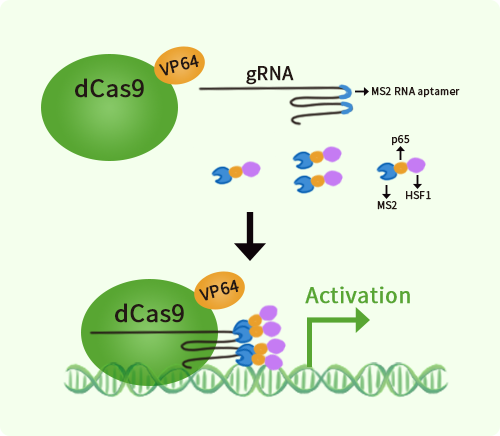Human TNF alpha (TNF) activation kit by CRISPRa
CAT#: GA104918
TNF CRISPRa kit - CRISPR gene activation of human tumor necrosis factor
CNY 12,255.00
CNY 1,999.00
CNY 2,700.00
CNY 800.00
Specifications
| Product Data | |
| Format | 3 gRNAs (5ug each), 1 scramble ctrl (10ug) and 1 enhancer vector (10ug) |
| Symbol | TNF |
| Locus ID | 7124 |
| Kit Components | GA104918G1, TNF alpha gRNA vector 1 in pCas-Guide-GFP-CRISPRa GA104918G2, TNF alpha gRNA vector 2 in pCas-Guide-GFP-CRISPRa GA104918G3, TNF alpha gRNA vector 3 in pCas-Guide-GFP-CRISPRa 1 CRISPRa-Enhancer vector, SKU GE100056 1 CRISPRa scramble vector, SKU GE100077 |
| Disclaimer | These products are manufactured and supplied by OriGene under license from ERS. The kit is designed based on the best knowledge of CRISPRa SAM technology. The efficiency of the activation can be affected by many factors, including nucleosome occupancy status, chromatin structure and the gene expression level of the target, etc. |
| Reference Data | |
| RefSeq | NM_000594 |
| Synonyms | DIF; TNF-alpha; TNFA; TNFSF2 |
| Summary | This gene encodes a multifunctional proinflammatory cytokine that belongs to the tumor necrosis factor (TNF) superfamily. This cytokine is mainly secreted by macrophages. It can bind to, and thus functions through its receptors TNFRSF1A/TNFR1 and TNFRSF1B/TNFBR. This cytokine is involved in the regulation of a wide spectrum of biological processes including cell proliferation, differentiation, apoptosis, lipid metabolism, and coagulation. This cytokine has been implicated in a variety of diseases, including autoimmune diseases, insulin resistance, psoriasis, rheumatoid arthritis ankylosing spondylitis, tuberculosis, autosomal dominant polycystic kidney disease, and cancer. Mutations in this gene affect susceptibility to cerebral malaria, septic shock, and Alzheimer disease. Knockout studies in mice also suggested the neuroprotective function of this cytokine. [provided by RefSeq, Aug 2020] |
Documents
Resources
| 基因表达相关资源 |
Other Versions
| SKU | Description | Size | Price |
|---|---|---|---|
| KN406983 | TNF - KN2.0, Human gene knockout kit via CRISPR, non-homology mediated. |
CNY 8,680.00 |


 United States
United States
 Germany
Germany
 Japan
Japan
 United Kingdom
United Kingdom
 China
China

